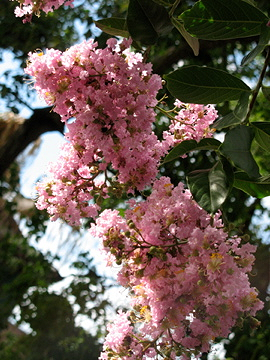“Nature does not hurry, yet everything is accomplished.” – Lao Tzu
 Crepe myrtle trees are ubiquitous in New Orleans, and often in the summer heat they are the only flowering plant that blooms. The flowers are tiny and delicate and grow in little bunches. A good afternoon thunderstorm can often leave a sidewalk or street littered with the fallen blossoms, creating a slippery mess.
Crepe myrtle trees are ubiquitous in New Orleans, and often in the summer heat they are the only flowering plant that blooms. The flowers are tiny and delicate and grow in little bunches. A good afternoon thunderstorm can often leave a sidewalk or street littered with the fallen blossoms, creating a slippery mess.
I remember, growing up, that I use to pick the little round pods that contained a flower yet to blossom and squeeze it to make the flower come forth. Come forth they did, but they were never as full and as lovely as the ones that opened in God’s good time.
Life is full of moments when we wish things would go faster than they do. Sometimes we try to rush things, and sometimes we succeed. Often, there is wisdom to the waiting in patient trust.
Our growth as human beings in relationship with one another and with God is a miraculous, delicate process that unfolds in a manner that is both painstaking as well as mysterious at times. God provides for us what we need every step along the way, holding onto us during those uncomfortable, in-between moments when we wish we could be more than we are, accomplish more than we can, and possess solutions to the challenges we face.
Nature teaches us that dying of the blossom and the falling of the leaves is as vital to the overall health of a tree as its greening and blossoming, but that each must happen when everything is ready. So it is with us.
What a gentle, wise gardener we have in God, who knows what each of us needs in order to make all of us blossom into what we are meant to be.

Sister Ann Marie Wainright
Sister Ann Marie Wainright is a Benedictine Sister of St. Scholastica Monastery in Duluth, Minnesota. Originally from New Orleans, Louisiana, she worked as a CPA for many years before earning dual masters degrees in counseling and pastoral studies. Sister Ann Marie is interested how people encounter God in their daily lives and how they use their faith and spirituality in meeting difficult challenges.
